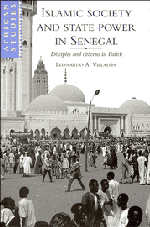Book contents
- Frontmatter
- Contents
- List of tables
- Acknowledgments
- A note on spelling
- Glossary
- Map of Senegal
- Introduction: good Africans, good citizens, good Muslims
- 1 Islam in the politics of state–society relations
- 2 The structure of society: Fatick in the Senegalese context
- 3 The state–citizen relationship: struggle over bridges
- 4 The marabout–disciple relationship I: foundations of recruiting and following
- 5 The marabout–disciple relationship II: the structures of allegiance
- 6 The state–marabout relationship: collaboration, conflict, and alternatives
- 7 Bureaucrats, marabouts, and citizen–disciples: how precarious a balance?
- Notes
- Select bibliography
- Index
- Titles in the series
5 - The marabout–disciple relationship II: the structures of allegiance
Published online by Cambridge University Press: 10 November 2009
- Frontmatter
- Contents
- List of tables
- Acknowledgments
- A note on spelling
- Glossary
- Map of Senegal
- Introduction: good Africans, good citizens, good Muslims
- 1 Islam in the politics of state–society relations
- 2 The structure of society: Fatick in the Senegalese context
- 3 The state–citizen relationship: struggle over bridges
- 4 The marabout–disciple relationship I: foundations of recruiting and following
- 5 The marabout–disciple relationship II: the structures of allegiance
- 6 The state–marabout relationship: collaboration, conflict, and alternatives
- 7 Bureaucrats, marabouts, and citizen–disciples: how precarious a balance?
- Notes
- Select bibliography
- Index
- Titles in the series
Summary
On Thursday nights in Fatick, as in any city or town in Senegal today, groups of local disciples of a particular marabout gather in the compound of one of their number for an evening of religious chanting, planning, and socializing. Usually several such groups can be heard at once; the Qadirs are distinguished by the rhythmic beating of their large Moorish drums, the Mourides with their preference for electronic amplification are inevitably the loudest, and groups of Tijans tend to sing the devotional poetry of El Hajj Malik Sy. The proliferation of such local groups, known as daairas, has been noted by many observers of Senegalese society. Along with the creation of religious study groups, the founding of new Arabic-language schools, the growing frequency of religious ceremonies, and the seemingly ever-increasing numbers of pilgrims at the annual commemorations in the holy cities of Touba and Tivaouane, the phenomenon has usually been interpreted as an indicator of religious fervor, another incidence of the much discussed “Islamic revival.”
No doubt there is some truth to this perspective – although in fact much of the motivation behind this new attention appears to follow the increased scholarly (and not-so-scholarly) concern with “resurgent Islam” in the wake of the success of the Islamic revolution in Iran, rather than any demonstrated importance of such developments in Senegal.
- Type
- Chapter
- Information
- Islamic Society and State Power in SenegalDisciples and Citizens in Fatick, pp. 149 - 199Publisher: Cambridge University PressPrint publication year: 1995



